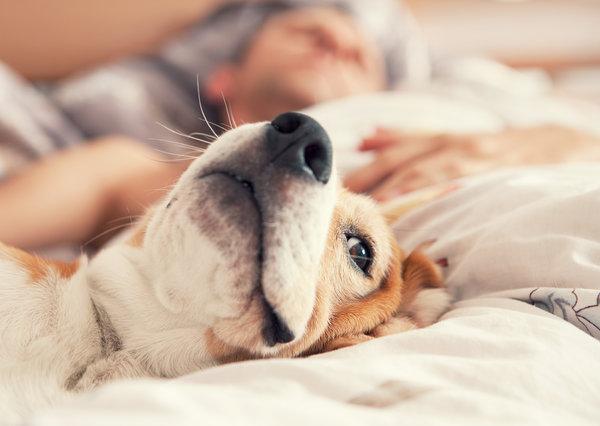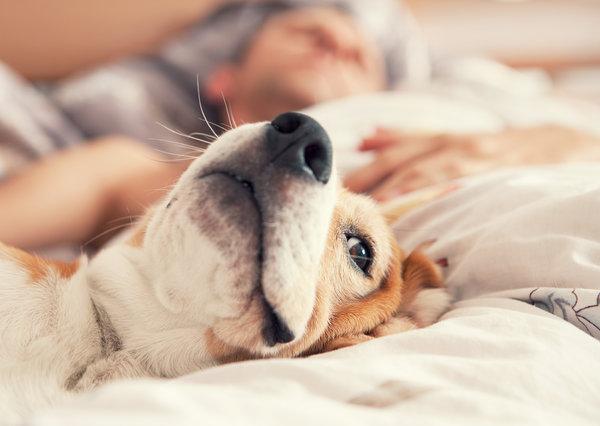
Sleeping with pets has been a popular practice for centuries, and for many, it is a comforting and enjoyable way to spend the night. But is it safe and healthy to sleep with your pet? This article will explore the positives and negatives, as well as provide tips on how to make the experience as safe and comfortable as possible.
Benefits of Sleeping with Your Pet
One of the primary benefits of sleeping with a pet is companionship. Pets provide emotional support, especially for those who live alone or have experienced a recent loss. Sleeping with a pet also gives us a feeling of comfort, as furry friends can offer relaxation during times of stress or anxiety. Additionally, pets can contribute to a sense of security, as their presence can help to deter potential intruders.
The other benefits include:
- Improved Sleep: Studies have shown that people who share their beds with their pets sleep better than those who don’t. This is because being in close contact with your four-legged friend can provide a sense of security and comfort, helping people to relax and fall asleep faster.
- Lower Stress Levels: People who sleep with their pets have been found to have lower levels of stress hormones and cortisol. As the presence of a pet can provide a sense of companionship, helping to alleviate feelings of loneliness and anxiety.
- Improved Mental Health: Studies have also found that owners who share a bed with their pets experience improved mental health, including lower levels of depression and anxiety. For the reason that animals help to improve feelings of well-being.
- Better Physical Health: People who sleep with their pets have also been found to have improved physical health, including lower blood pressure, and reduced risk of obesity and cardiovascular disease. This is likely because having a pet around can reduce feelings of stress and anxiety, helping to improve overall physical health.
Common Risks of Sharing the Bed with Your Pet
- Hygiene: Pets often bring in dirt and bacteria from the outdoors that can cause health problems for humans.
- Allergies: Pet dander and saliva can trigger allergic reactions in people, causing sneezing, coughing, and even asthma attacks.
- Unwanted Noises: Animals can make loud noises at night that can disrupt sleep.
- Parasites: Four-legged friends can bring in parasites such as fleas and ticks that can cause skin irritation and other health issues.
- Odor: Pets can produce undesirable odors that can affect air quality in the bedroom.
There are certain risks associated with sleeping with pets. These include potential exposure to allergens, such as dander and saliva, as well as other parasites, such as fleas and ticks. Additionally, pets can disturb your sleep, which can lead to fatigue and decreased productivity during the day. Animals may also introduce bacteria and other germs into the bed, which can lead to skin infections, rashes, and other health problems. Finally, there is the risk of injuries from pets, such as scratches or bites.
There are a few things you can do to ensure a safe and enjoyable sleep with your pet:
- Place a comfortable pet bed near your bed. This will provide your furry friend with a cozy area to sleep in and will prevent them from climbing into your bed.
- Make sure the pet bed is large for your kitty or doggo. It should have enough space for them to stretch out, turn around, and get comfortable.
- If possible, have a designated area in your bedroom for your pets to sleep. This will help keep the rest of your room clean and free from pet hair.
- Use pet-safe bedding. Make sure the materials are convenient for your pet and don’t contain any chemicals that could be harmful.
- Provide your animals with plenty of toys, blankets, and treats to make them feel comfortable and secure.
- Make sure your furry friends are up to date on all of their vaccinations and that they are free of any fleas or ticks.
- Never leave your pets unattended in the bedroom. They may become restless or attempt to explore, which could be dangerous. You may consider quality pet cameras for cats and dogs for constant control.
- Spend some time with your pets before bed. This will help them relax and make it easier for them to fall asleep.
Conclusion
Whether or not to sleep with a pet is a personal decision with both potential risks and benefits. Those who suffer from allergies should take extra precautions, such as regularly cleaning the bedroom and keeping the pet out of the space altogether. Ultimately, it is important to weigh the risks and benefits before deciding to share your bed with a furry friend or not.








